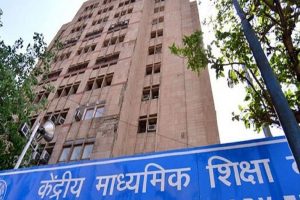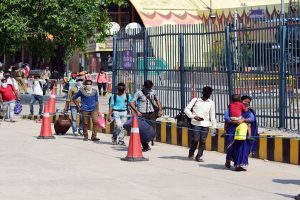The Supreme Court today rejected the plea by NGO Association for Democratic Reforms, ADR, for a stay on issuance of electoral bonds, scheduled from April 1 to 10, 2021 amid the assembly elections in five states. The plea was heard by a three-judge bench led by Chief Justice of India SA Bobde.
The apex court said that the electoral bonds had been issued several times before and that there is no evidence that has brought about its adverse impact on elections. The Supreme Court added that no interim order is required in the case as it had earlier issued certain interim orders, including directing political parties to submit details of donations received through electoral bonds in a sealed cover to EC. The bench had reserved the order in the case on March 24 after hearing arguments from all the parties in the case.
The central government had on January 29, 2018, notified the electoral bond scheme. It is like a promissory note that can be bought by any Indian citizen or company incorporated in India from select branches of the State Bank of India. The citizen can then donate the same to any eligible political party of his/her choice.
The plea of NGO had said the sale of fresh electoral bonds should be stopped till the top court decided the three pending petitions challenging Electoral Bond Scheme 2018 which granted anonymity to donors to political parties.
Experts point out that electoral bonds are most likely the first-of-its-kind instrument in the world used for funding political parties.
While the United States has Political Action Committees which receive money from individual and corporate donors and manage them, they do not have any scheme that allows the citizen to directly purchase a bond and donate the same to a political party.
The prayers made in the writ petition were for:
-
a declaration that all national and regional political parties are public authorities under the Right to Information Act, 2005;
-
a direction to the Election Commission of India to collect all information concerning the finances of political parties;
-
a direction to all national and regional political parties to mandatorily disclose complete details about their income, expenditure, donations and funding as well as full details of the donors.
The Court also said that the apprehension that foreign corporate houses may buy the bonds and attempt to influence the electoral process in the country, is also misconceived. Under Clause 3 of the Scheme, the Bonds may be purchased only by a person, who is a citizen of India or incorporated or established in India
The CJI further said that in the light of the fact that the Scheme was introduced on 2.1.2018; that the bonds are released at periodical intervals in January, April, July and October of every year; that they had been so released in the years 2018, 2019 and 2020 without any impediment; and that certain safeguards have already been provided by this Court in its interim order dated 12.4.2019, we do not see any justification for the grant of stay at this stage. Hence both the applications for stay are dismissed..
In April 2019, the Court introduced an interim “safeguard” by directing all political parties to submit details of receipts of the electoral bonds to the Election Commission in a sealed cover. This was done as an interim measure till the pending petitions challenging the validity of these electoral bonds were decided. With this order still in vogue, the bench, also comprising Justices AS Bopanna and V Ramasubramanian, said, “certain safeguards have already been provided by this Court in its interim order of April 12, 2019, (and) we do not see any justification for the grant of stay at this stage.”
Earlier in April 2019, a bench headed by Chief Justice Ranjan Gogoi had said, the issue requires a detailed hearing and, therefore, it will be taken up on April 10, 2021.

Advocate Prashant Bhushan, appearing for the NGO alleged that thousands of crore of rupees are anonymously being given to political parties. Attorney General KK Venugopal, appearing for the Centre, said the electoral bonds scheme was brought to check the flow of black money into political funding. ADR’s application seeks to stay on the Electoral Bond Scheme, 2018, which was notified by the Centre in January last year.
The Finance Act, 2017 introduced the concept of “electoral bond” which are exempted from disclosure under the Representation of People’s Act, 2017. The central government had on January 29, 2018, notified the electoral bond scheme. It is like a promissory note that can be bought by any Indian citizen or company incorporated in India from select branches of State Bank of India. The citizen can then donate the same to any eligible political party of his/her choice.
ABOUT THE AUTHOR SANJAY CHAVRE Mechical Engineer with MBA; LL.B ( First Semester) in Maharshi University of Information Technology, Maharshi Law School , NOIDA. He retired in Aug 2020 as Senior Development Officer in Ministry of Heavy Industry, Govt of India . Previously he was in charge of investment promotion and international cooperation between Europe and India in the Ministry of Industry and Commerce. Mr. Chavre has more than 37 years of work experience in the Government mostly in technology/ industrial development and promotion. He has been focal in raising institutions of industrial infrastructure and technology development in diverse fields like locks, stones, machine tools, auto components, tool rooms, Environment management facilities, quality & productivity improvement, manufacturing technology etc.







 2 DAY WORKSHOP ON “CONTRACT DRAFTING” BY LEGALIFY INDIA & JLSR [LIMITED SEATS] : REGISTER NOW
2 DAY WORKSHOP ON “CONTRACT DRAFTING” BY LEGALIFY INDIA & JLSR [LIMITED SEATS] : REGISTER NOW





Add Comment